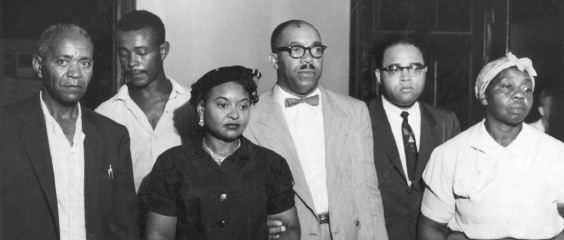The Lighthouse® is the weekly email newsletter of the Independent Institute.
Subscribe now, or browse Back Issues.
Volume 20, Issue 33: August 14, 2018
- Good Medicine: Some Progress, Though More Is Needed
- Feds Reopen Emmett Till Murder Case, but Will Justice Prevail?
- Trump’s Iran Policy Likely to Fail
- Housing California: Two Bad “Solutions”
- The Beacon: New Blog Posts

The Food and Drug Administration exerts tremendous control on the pharmaceutical industry, one of the most highly regulated in the United States. Nevertheless, despite political rhetoric to the contrary, there are reasons for optimism. According to Independent Institute Research Fellow Raymond J. March, three trends are particularly encouraging. The first is national right-to-try legislation, which President Trump signed into law on May 30.
Weeks after the bill became law, Brainstorm Cell Therapeutics began offering patients with terminal ALS (Lou Gehrig’s disease) an opportunity to try NurOwn, its experimental treatment. Other pharmaceutical firms are likely to follow this lead. And although this progress came through national legislation, there are signs the FDA itself is also adopting a more open mindset, such as the agency’s Stage 2 approval for the use of MDMA (a.k.a. ecstasy) to treat post-traumatic stress disorder.
Also encouraging is the FDA’s recent approval of Epidolex, a marijuana-based drug for treating rare childhood epilepsy. “Perhaps more important than any of these developments is that each of them emerged from local movements to curb government involvement in the pharmaceutical market,” March writes in The Beacon. “The pharmaceutical industry remains highly regulated, and politicians aim to keep it that way. However, when public opinion runs counter to political rhetoric and the public remains motivated, widespread change can happen.” May public opinion prescribe more good medicine.
Three Reasons To Be Optimistic about Pharmaceutical Policy, by Raymond J. March (The Beacon, 8/2/18)
Right-to-Try Is Just What the Doctor Ordered, by Raymond J. March (The Hill, 7/13/18)

More than 60 years after an all-white jury acquitted two white defendants in the murder of 14-year-old African-American Emmett Till in rural Mississippi, the Justice Department announced recently that it has reopened the case. If anything comes out of the investigation, the heroic activism of black organizer, physician, and entrepreneur T.R.M. Howard will surely merit credit, according to his biographers David T. Beito and Linda Royster Beito.
Months after their trial, half-brothers J.W. Milam and Roy Bryant confessed to Till’s murder in Look magazine, but the rules of double-jeopardy precluded a retrial. Howard, though, maintained the two had accomplices. “He also cited evidence (also later proved true) that the local sheriff had conspired to hide crucial witnesses,” the Beitos write in an op-ed at Real Clear History.
Never one to cower from intimidation, Howard took the audacious step of publicly chastising FBI Director J. Edgar Hoover for doing little in regard to the murders of blacks in the South. Hoover took an unprecedented counter-measure: He “responded by shooting off an open letter to the press charging Howard with ‘intemperate and baseless charges,’” the Beitos continue. Although the outcome of the reopened Till murder case is unknown, history has already judged Howard a bold visionary. Four days after Rev. Martin Luther King Jr. hosted Howard’s post-trial speech in Montgomery, Alabama, one member of the audience refused to give up her seat on a segregated city bus: Rosa Parks. “She later said she was thinking of Emmett Till,” the Beitos conclude.
Emmett Till, a New Investigation, and Vindication of T.R.M. Howard, by David T. Beito and Linda Royster Beito (Real Clear History, 8/10/18)
T. R. M. Howard: Doctor, Entrepreneur, Civil Rights Pioneer, by David T. Beito and Linda Royster Beito

In the early 1990s, the most stringent multilateral economic sanctions in modern history failed to compel Saddam Hussein to withdraw Iraqi troops from neighboring Kuwait. Today, President Trump’s unilateral sanctions on Iran—a consequence of reneging on the U.S. commitment to the Iran nuclear deal—are unlikely to compel Tehran to comply with the administration’s wishes, argues Independent Institute Senior Fellow Ivan Eland.
“Instead of backing out of the agreement, if Trump believed it was inadequate, he could have used his negotiating prowess to make the agreement permanent or add Iran’s other objectionable behaviors to it,” Eland writes at Real Clear World. “In other words, establish trust with the Iranians by honoring the U.S. commitment, then build on the agreement rather than torch it. But bluster and threats prior to negotiation is Trump’s style.”
The president is highly unlikely to get what he wants by exerting U.S. pressure on Iran because, writes Eland, “unilateral sanctions are never as economically effective as multilateral ones.” Indeed, Trump may have driven his European counterparts to encourage European firms to engage in more trade with Iran. In the realm of international negotiations, the president still has much learn about the art of the deal.
Sanctions on Iran Won’t Do What Trump Wants Them to Do, by Ivan Eland (Real Clear World, 10/9/18)
Recarving Rushmore: Ranking the Presidents on Peace, Prosperity, and Liberty, by Ivan Eland

California’s often-surreal housing prices have mostly inspired two policy responses from activists: inclusionary zoning and (lately) more local rent control. Both are harmful, though it’s not always clear which is worse. In a recent op-ed for the San Francisco Chronicle, Independent Institute Research Fellow Gary M. Galles identifies their differences and commonalities.
Inclusionary zoning ordinances, which afflict nearly 170 jurisdictions in the state, require developers to sell a portion of their new housing units at “below market” prices. As night follows day, this merely drives up market prices and harms potential first-time homebuyers while benefiting existing homeowners who benefit from the extra push in home prices this mandate creates. The new campaign for more local rent-control authority (Proposition 10 on the November 2018 ballot would allow city officials to enact controls on units first occupied after February 1, 1995) would also create disparate impacts on haves and have-nots: It can help current renters (provided, for example, their landlords continue to keep the units in good condition), but it harms would-be renters by weakening incentives for new rental units.
“With inclusionary housing policies and rent control, a local majority of voters is allowed to benefit itself while pretending to support those struggling to find housing,” Galles writes. “Such self-interested but harmful housing altruism is far removed from doing something good for society.”
Rent Control and Inclusionary Housing Policies are Self-Interested and Harmful, by Gary M. Galles (San Francisco Chronicle, 7/20/18)
Housing America: Building Out of a Crisis, edited by Randall G. Holcombe and Benjamin Powell
- Mining Regulations Hamper Access to America’s Own Rare Earth Metals and Minerals, by William Shughart
- Strike Three for DMV, by K. Lloyd Billingsley
- Dozy DMV Wants More Dollars, by K. Lloyd Billingsley
- Open Up Off-Label Drug Communication and Let the Market Work!, by Raymond March
- Paying at the Pump, by K. Lloyd Billingsley






